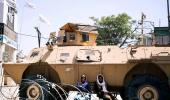If New Delhi finds itself out in the cold in Afghanistan, both the Congress-led UPA and BJP-led NDA have only themselves to blame.
Each has been in power for a full decade from 2001, without reaching out to the Taliban, points out Ajai Shukla.

With the Taliban's supreme leader, Mullah Haibatullah Akhundzada, announcing the Islamic Emirate’s new government in Kabul, the contours of political and financial power in Afghanistan are apparent.
But the real indicators of stability and reconciliation in Afghanistan will be the extent to which the Taliban shares power with non-Taliban groups. The Taliban is clearly under no military compulsion to share power, given the ease with which it overran rival militias in its advance across Afghanistan.
The series of rapid surrenders by the Afghan National Security Force have left $85 billion worth of American equipment in the hands of the Taliban. This includes over 200 aeroplanes and helicopters, some of which are the highly capable Black Hawk choppers; 75,000 vehicles, 600,000 small arms (rifles, carbines and machine guns), state-of-the-art night vision goggles and body armour.
This new-found arsenal, combined with planning and logistical support from the Pakistani military, makes the Taliban a force that can rapidly overpower most rivals.
Its vulnerability, however, lies in the economic realm. A severe drought and the ebb and flow of battle have made refugees of tens of thousands of Afghans. The new government desperately needs funds to function, but the Taliban has not been given access to $10 billion in overseas assets belonging to the Afghan central bank.
Afghanistan's economic outlook is bleak, with real gross domestic product expected to shrink by 9.7 per cent this financial year and see a further drop of 5.2 per cent next year, according to a Fitch Group analysis.
There is pressure too on the Taliban from the United Nations. As Taliban fighters swept across the country in the first half of August, the UN Security Council declared on August 3 that 'they do not support the restoration of the Islamic Emirate.' However, given the Taliban's rapid battlefield gains and the breakdown of state authority, this assertion was never repeated.
Then, on August 31, after the suicide bomb attack outside Kabul airport, UNSC Resolution 2593 of 2021 stated (with Russia and China abstaining) that Afghanistan's territory must never be used to threaten or attack another country, and reiterated the importance of combating terrorism in Afghanistan.
The resolution also noted the Taliban's statement of August 27, in which it committed that Afghans would be able to travel abroad, leave Afghanistan anytime they want to, and may exit the country via any border crossing.
Who are the winners and losers of the two-decade-long Afghanistan war?
Conventional wisdom has it that, at the superpower level America has lost badly and that China and Russia are, therefore, the gainers.
At the regional level, Pakistan is regarding itself as the big winner, having planted its proxy, the Taliban, firmly on the seat of power in Kabul.
The Taliban's presence, or so the Pakistani generals believe, will ensure that India's role is severely circumscribed.
But the reality might be somewhat more nuanced.
The US has clearly emerged from Afghanistan a diminished power, after spending $2.313 trillion on a grinding, 20-year, military contest.
America has lost 2,442 soldiers and 3,846 private contractors and successive US governments have incurred an obligation to provide lifetime care for some 20,000 military veterans who bear the external and internal scars of this war.
Then there are the large interest payments on money borrowed to fund the war.
And while the US has grappled with these mounting bills, its primary strategic competitor, China, has grown its economy and its military. Beijing couldn't have written a more favourable script.
Washington will now confine itself to an 'over the horizon' presence, stationing intelligence and long-range strike assets -- missiles and unmanned aerial vehicles -- within range of Afghanistan.
But Pakistan may be miscalculating in concluding that it has pegged back America.
For two decades, Washington has remained beholden to Islamabad, paying billions for logistic, operational and intelligence assistance.
All these years, America has gritted its teeth and borne Pakistani perfidy, even when Osama bin Laden turned out to be living in the shadow of a major Pakistani cantonment.
Disregarding US military commanders in Afghanistan who complained that American soldiers were dying at the hands of insurgents based in Pakistan, Washington continued providing arms and equipment to the Pakistani military, including modernised and upgraded F-16 fighters. This tolerance is now likely to end.
Pakistan will also face Chinese pressure to rein in Afghanistan-based militants.
On July 28, during a visit to Beijing by Mullah Baradar, Chinese Foreign Minister Wang Yi asked him to sever the Taliban's links with the East Turkistan Islamic Movement, an Uyghur militant group that operates in Xinjiang.
Baradar reportedly assured Wang that the ETIM would be shut down.
Earlier, Beijing said it would only recognise the new regime in Kabul if it was an 'open, inclusive and broadly representative government that echoes the widely shared aspirations of its own people and the international community.'
That leaves India!
If New Delhi finds itself out in the cold in Afghanistan, both the Congress-led United Progressive Alliance and the Bharatiya Janata Party-led National Democratic Alliance have only themselves to blame.
Each has been in power for a full decade from 2001, without reaching out to the Taliban.
New Delhi unforgivably convinced itself that, with the US and the North Atlantic Treaty Organisation managing security in Afghanistan, India could enjoy an endless free ride.
Fortunately, India can claim credit for an excellent $3 billion humanitarian aid programme in Afghanistan, which the new Taliban regime has invited us to continue.
India must leverage that credit to build its rightful presence in Afghanistan.












 © 2025
© 2025